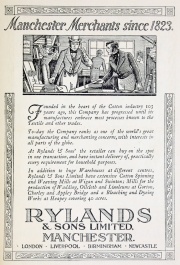Rylands and Sons



Rylands and Sons of Wigan and of Faulkner Street, Manchester.
1819 Joseph Rylands, a cotton manufacturer, merged his retail business with the business of his sons (Joseph, Richard and John), creating the firm of Rylands and Sons. At its peak, the company employed a workforce of 15,000 in 17 mills and factories, producing 35 tons of cloth a day.[1] The business was moved to Wigan.
1823 John Rylands opened a warehouse for the firm in Manchester.
1825 The firm became merchants in addition to their manufacturing activities.
Extensive properties at Wigan and dye and bleach works were acquired. Valuable coal seams were discovered under these properties
c.1839 Joseph and Richard retired
1847 Joseph senior died, leaving John in sole charge of the business
1850 Dissolution of the Partnership between Richard Rylands, Joseph Rylands, John Rylands, John Cross and Joseph Cross, in the businesses of Cotton Spinners and Coal Proprietors, carried on at Wigan, in the county of Lancaster, under the style or firm of the executors of the late Joseph Rylands, so far as respects me the said Joseph Rylands; and that all debts owing to or by us, in respect of the said businesses, will be received and paid by the said Richard Rylands, John Rylands, John Cross, and Joseph Cross, by whom the said businesses will in future be carried on.[2]
1870 Owned the Gidlow and Swinley Collieries at Wigan.
1870 Dissolution of the Partnership between John Rylands and John Cross, as Cotton Spinners and Colliers, at Wigan, in the county of Lancaster, and elsewhere, under the firm of Rylands and Cross, was dissolved by mutual consent. All debts will be received and paid by the said John Rylands.[3]
1872 Dissolution of the Partnership formerly existing between John Rylands and Reuben Spencer, in the business of Merchants, under the style or firm of Rylands and Sons, at Wood-street and Philip-lane, in the city of London, and at New High-street and the Medlock Mills, in the city of Manchester, and elsewhere; the said business has, as from that date, been carried on, and will henceforth be carried on, by the said John Rylands alone[4]
1873 The company was registered on 25 October, to take over the business of the firm of the same name as manufacturers and general warehousemen. [5]. The firm became the largest textile manufacturing concern in Britain.
1880s Reported to have built a few steam locomotives.[6]
1884 Installed a horizontal cross-compound engine by W. Sharples and Co at their Dacca Twist Mill, Water Street, Manchester. Cylinders 22" and 38" diameter, 5 ft stroke. Gear drive, the spur flywheel being 12 ft 8" diameter and 16" wide, the pinion 5 ft 7" diameter. The teeth were cast, not machined, but were said to run 'almost noiselessly'.[7]
1888 An obituary of John Rylands noted that he 'occupied pretty nearly the whole of New High-street and Bread street, to say nothing of his large warehouse in Wood-street, Cheapside, London, and the great manufacturing works at Gorton, and at Ainsworth, near Bolton. To these were after- wards added the Longford Mills, Oxford-street, Chorlton-on-Medlock; the Dacca Mills in Water- street; the Medlock Mills in South Junction-street; the Gidlow Works at Wigan; the Mather-street Mills in Bolton; the mills at Swinton and Walkden Moor; the Cluster-street Mills and Longford Works at Crewe; the Heapey Bleach and Dye Works, near Chorley; and extensive branches in London and Liverpool. His Manchester warehouses now occupy most parts of New High-street and Bread-street, and considerable sites in Tib-street, Bridgewater-place; Joiner-street, and Market-street.'[8]
1891 Gidlow Works, Wigan; printers, shirtings and domestics; and at Gorton Mills, Manchester. Pay days Tuesday and Friday at 25, Faulkner street, Manchester. Telegrams, "Rylands, Wigan."
1891 Directory: Listed as Cotton Spinners and Manufacturers. More details
1891 Directory (Wigan): Listed as Cotton spinner and manufacturers. More details
1924 Acquired Thomas Witter and Co.
1953 Acquired by Great Universal Stores.[9]
1960 Acquired Hickson, Lloyd and King.[10]
Note: Manchester's impressive John Rylands Library, which opened to the public in 1900, was founded by Enriqueta Augustina Rylands in memory of her husband, John Rylands [11]
See Also
Sources of Information
- ↑ Wikipedia entry.
- ↑ London Gazette 21Jan 1851
- ↑ London Gazette 8 September, 1871
- ↑ London Gazette 14 Nov 1873
- ↑ The Stock Exchange Year Book 1908
- ↑ British Steam Locomotive Builders by James W. Lowe. Published in 1975. ISBN 0-905100-816
- ↑ Engineering, 13 June 1884
- ↑ Liverpool Mercury - Wednesday 12 December 1888
- ↑ Dundee Courier, November 20, 1953
- ↑ The Times, April 12, 1960
- ↑ [1] Wikipedia entry for John Rylands Library
- Dictionary of National Biography: John Rylands

